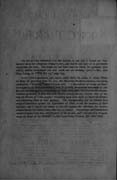
[p. 2]
"As far as I am concerned, I do not hesitate to say that I believe all these murders lie at his (Brigham Young's) door, and that he will have to be personally responsible of them. His hands are red with innocent blood, his garments dyed with it, and no 'atonement' can ever wash out the damning spots."—Mrs. Ann Eliza Young, in "Wife No. 19," page 199.
In the Utah Legislature, JAN. 25th, 1876, while the claim of Adam Wiley for $294 for guarding John D. Lee, the Mountain Meadows butcher, was being considered, "APOSTLE" JOHN TAYLOR said: "I am desirous of seeing an honest investigations of these expenditures, and, if possible, to ascertain how much of this $56,000 has been used in prosecuting our VERY BEST, MOST HONORABLE AND PRAISEWORTHY CITIZENS, by those men who run the Courts, and are desirous only of cutting the throats of "this people," trampling upon their rights as American citizens and plundering them of their property. The GOVERNMENT and the COURTS have arrayed themselves against the Legislature of Utah, to rob the members of their just dues, and I consider the claims of persons against the Territory for service rendered under the United States Marshal, as frauds. GOVERNORS and JUDGES have conspired against the lives and property of this people, and I am opposed to strenthening the hands of the ENEMY."—Salt Lake Daily Tribune, Jan. 26th, 1876.
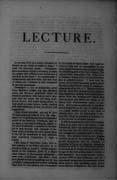
[p. 3]
LECTURE.
In the year 1873, in a lectuer delivered in Boston on the "State of Affairs in Utah," I used the following words: "Clergymen have sometimes found it necessary to enter the pulpit with a Bible in one pocket and a revolver in the other." In a public letter I subsequently said that while this was true of others, yet I referred in that statement to my own experience.
Thereupon a cry of indignation arose from Mormon pulpits and the Mormon press; the Mormon preisthood lifted its hands in professed holy horror, and I suppose that my name has not been mentioned since a half dozen times either in that pulpit or press without being coupled with that statement, grossly perverted and exaggerated.
I have always intended, not only to give the circumstances referred to in the statement, but to publicly examine the historical record of the Mormon Priesthood, and in the light of that record determine which is the more consistent—a preacher of the Gospel to arm himself with weapons of defense while pursuing his work among them if his life he threatened or they manifest such marvelous indignation at such a course.
I also think it well, while doing this to take occasion to lay before the world in as concise a form as possible, certain matters which, in the attention given to a single other feature of Mormonism—polygamy—have been overlooked. The facts I shall now present are truly appalling, and it was not until I commenced the work of coallating these facts for this leture, that I was aware of the extent to which crime had been allowed to exist and go unpunished in our land, simply because it was committed under the sheltering garb of the word religion. The crimes I here enumerate, I lay at the door of Brigham Young and a few associated with him in priestly tyranny. I have ever believed, as now, that the greater portion of the Mormon people would revolt at those atrocities as much as you or I. Because of them and the spirit that prompted their commission, many have already emancipated themselves from the bondage into which they were decoyed, and others are doing so as fast as their circumstances render it possible. But in this arraignment of the Mormon Priesthood, at the bar of public opinon, I shall confine myself to one class of offences alone, viz: the destruction of human life, either for purposes of plunder or in the interest of so-called religion.
It will be seen that this kind of lawlessness began at an early day in the history of this Priesthood, that it has continued to the present time, and that the spirit of it now exists and occasionally manifests itself in the Teritory. The evidence that I have to present consists in part of the confession of guilty parties themselves, who by coercion, or under the influence of religious fanaticism became the tools of this Priesthood; in part of the records of United States officials, and in part of the well authenticated history of this Territory. In a single lecture I cannot present a tithe of this testimony, and yet I apprehend enough shall be presented to lead us to believe that anything short of the most effective measures on the part of our
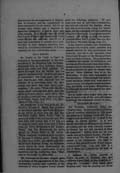
[p. 4]
Government for the suppression of the system of outlawry and the punishment of those responsible for its record, will be an outrage upon society and a disgrace to American citizenship. I wish to make one other remark. It is possible that the words that I speak to-night may reach many thousands beyond this audience, and hence I shall find it necessary to present some matters that by their common notoriety here would be considered unneccesary, if I were speaking for your information alone.
EARLY HISTORY.
Mr. Beadle in his "Life in Utah," in speaking of the causes that led to the early expulsion of the Mormons from the States, designates them as first, criminal; second, moral and social; and third, political. He shows at length how the Church was the place of rendezvous for "outlaws and bands of maranders;" how "they made their way into Nanvoo and were baptized into the Church as a convenient cover for their crimes and made that their secret head-quarters." He adds: "Thus while the Mormons could truly say that there was less crime in Nanvoo than in most other cities of its size, it was still true that more criminals issued thence than from any other. (Life in Utah, Chap. 2.)
Mr. Stenhouse in his work gives the affidavits of Thomas B. Marsh, first president of the twelve Apostles, and Orson Hyde, one of the twelve, in which they say that they had heard Joseph Smith declare "that he would yet tread down his enemies, and walk over their dead bodies; that if he was not let alone he would make it one gore of blood from the Rocky Mountains to the Atlantic Ocean; that like Mohammed, his motto should be "Joseph Smith or the sword." Which bombastic utterances show the spirit of the man if nothing more. Surely when he went up (or down), his mantle must have fallen upon Brigham Young; for substitute in the above the word "bowie-knife" for sword, and you have a motto more fit to be inscribed over his institution than "Holiness to the Lord," so often used.
Mr. Stenhouse in the same chapter gives the account of the organization of the Danite band for murder and outlawry; of the existece of which Brigham Young himself gives the following testimony. "If men come here and do not behave themselves, they will not only find the Danites, whom they talk so much about, biting horses' heels, but the scoundrels will find something biting their own heels. In my plain remarks I merely call things by their own names.(Deseret News, Vol. 7, p. 143. See also History Rocky Mountain Saints, chap. 15.)
It was, beyond a doubt, this lawslessness, together with the foul social practices and general hostility to civil government and authority, that led to the expulsion from Illinois and Missouri of the Mormon Priesthood and their followers. They had become a stench in the nostrils of civilization, and in a country free about all others from tyranny and religious intolerance, they could not be safely allowed to exist in contact with society. Elder Penrose lays it to the Methodists. If they were responsible for this expulsion, it was through that healthy moral sentiment, which they with other religious bodies had helped to create and maintain, and which now makes Mormonism a by-word and reproach throughout the civilized world.
But we cannot dwell longer here, and we pass to notice some of the more prominent features of its subsequent record of crime.
THE RECORD OF BLOOD.
Bill Hickman, commonly called the "Danite Chief," in his Confessions, presents a list of murders, committed by him under the dictation of Brigham Young and his associates that can scarcely be equaled in the annals of human atrocity. It is well known here that his statements are received as reliable, and the most common remark is "that he has not told one-half of what "he might tell." Indeed these are his own words uttered to a friend of mine. The Mormons attack the character of Hickman in answer to his Confessions. The reply to which is that philantropists do not usually commit such deeds. I can only refer to a few of these, and I quote from his book of Confessions.
I instance the bloody murder of Hatch by order of Brigham, who said "that was a good deed, let who would do it." (Page 83). "Vanghn," after whose death Brigham said "take the property and divide
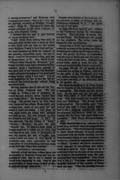
[p. 5]
it among yourselves," and Hickman adds concerning his share, "this is all I ever got for services rendered on Brigham Young's order." (Page 87). The smell of blood was always overcome by the sweet perfume of gold, with Brigham Young.
I instance also the case of poor Hartley of whom Hickman says:
"I saw Orson Hyde looking very sour at him, and after he had been in camp an hour or two, Hyde told me that he had orders from Brigham Young to have him used up." He then mentions in detail the manner of the murder, committed under the eye of Hyde—recieve his commendation, and that of Hosea Stout, (P 97). Mrs. Smith in her "Fifteen years before Hickman's Confessions, gives a heartrending account of this deed, and of her meeting with Hartley's widow, whom she describes as "the most heart broken human being I ever saw." It is almost impossible for one to read the full account of this horrid murder without being moved to tears.
We may mention also in this list the killing of Yates. Hickman says: "We met Joseph A. Young, a son of Brigham; he hailed me and said his father wanted that man Yates killed." He thus describes the killing: "No person was to be seen, when Col. Jones and two others, Hosea Stout and another man, came to my camp fire and asked if Yates was asleep. I told them he was, upon which his brains were knocked out with an axe. He was covered up with his blankets and left lying." (P. 124,) Of like character was the kiling of "Buck," "Dron," "McNeal," the poor old man "Arnold," etc. To describe these deeds at length would be to detain you too long. [As one lays down this book of Hickman's he can but admire the zeal of certain men whom I need not name, in their efforts to shield the man really responsible for this long array of blood-curdling murders, from abuse through "legal technicalities."
HISTORICAL AUTHORITIES.
Scarcely a book has been written upon the domination of Brigham Young and his associates in Utah, that is not a record of blood from beginning to end. One of the most reliable of these works, is that of Mr. Stenhouse already referred to.
Chapter after chapter of the most horrifying accounts of deeds of violence and oppression are contained in it. I can quote but one or two cases.
On pages 298 three cases of mob violence by the Priesthood during the reformation are given. They are those of Jarvis, Wilson and Slater. The details are not proper for the platform. The writer closes the statement with the following:
"Some men in Provo had rebelled against authority in some trivial matter, and Bishop Blackburn shouted in his Sunday meeting, 'I want the people of Provo to understand that the boys in Provo can use the knife as well as the boys in San Pete. Boys get your knives ready, there is work for you. We must not be behind San Pete in good works.'
On pages 469 and 470 he speaks of one Jones and his mother at Payson, both shot by the order of the Priesthood, of a wife and mother whose throat was deliberately cut to save her soul; of an elder shot dead in his garden, etc.
But the most shocking of all these crimes was the murder of the Parrishes and Potter at Springville. The details are well known here. An old man and his son and one other were about to leave his delectable Zion. They were decoyed out as night and shot and butchered. The fullent confessions are given. The historian says: "The facts of this deed of blood clearly exhibit that it was a religious murder; the details are sickening and leave no room for questioning why the deed was done—they were Apostates." (Hist. Rocky Mountain Saints, p. 462.)
Judge Cradlebaugh in an address to the grand jury at Provo which investigated this murder says: "The Court has had occasion to issue bench-warrants to arrest persons connected with the Parish mruder, has had them brought before it and examined; the testimony presents an unparalleled condition of affairs. It seems the whole community were engaged in committing that crime. Facts go to show it. There seems to be a combined effort on the part of the community to screen the murderes from the punishment they have committed." (Des. News Vol. 9, No, 4.) This same historian gives a detailed account of the murder of Brassfield and says: "That the shooting was pre-
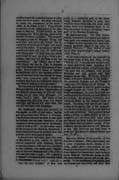
[p. 6]
meditated and the intention known to other there can be no doubt. No effort was made to arrest the perpetrator of the crime." (Hist. R. M. Saints, p. 615.) Then follows an account of the assasination of Dr. Robinson in this city. He had formed an idea of securing the Warm Spring, north of the city and building a hospital. The property was highly prized by Brigham Young, and as all here well know, the Doctor was decoyed out of his house at night and cooly shot in the street. In a sermon in the Tabernacle soon after this (Dec. 23, 1868) Brigham Young said—"If they jump my claims here I shall be very apt to give them a preemptive right that will last them to the last resurrection." (See Vidette, Jan. 8, 1867.) Gen. Hazen was sent to Utah to examine into Utah affairs for the information of Congress. In his report he labors to befriend the Mormons, but of this murder of Robinson he says that it and the murder of Brassfield, "were committed under Church influences; that there are principles taught in that Church leading to such murders."
He recommends the seizure of prominent Mormon official and their incarceration in the Missouri penitentiary till this and other crimes are by them fully divulged. (Vidette, April 8, 1867.) The blood of this murdered man still cries from our streets unto God, and the day will come when that cry will call down swift vengeance.
Mr. Beadle and others give accounts of the murder in 1858 of that brave, fearless and independent man Wallace A. Bowman. The Mormon account was that it was done by Indians; but the clear testimony of his companion shows that it was by the Danites. (Life in Utah p 170.) In the whole record of the crimes of the Mormon Priesthood I have found nothing more devilish than this mruder; but I must pass it hastily.
I also give the following from this work of Mr. Beadle, p. 172. Almon N. Babbitt having quarelled with Brigham, started across the plains in 1855 and was mrudered by the Indians, who spoke good English; and of this case Brigham said—'He lived a fool and died like a fool. He undertook to quarrel with me and was soon after killed by the Indians.'"
"Lo! the poor Indians!" If they were guilty of a hundreth part of the crime which Brigham attributes to them, they would be worse fiends than the most rabid Indian hater ever estimated them to be. They are indeed the most convenient "scape goat" of the Mormon Priesthood.
Mr. Beadle also says: "In 1852, Lieutenant M. Creuzfeldt, the botonaist and eight of their party were massacred near Bevier Lake by Indians as then reported; but soon after escaped Apostates state it was done by painted Mormons." Then follows a long list of other crimes which I cannot notice. (Ibid, Chap. 5.)
Of the many chapters of like character in the recent work of Mrs. Ann Eliza Young "Wife No. 19," I can only refer briefly to two or three Individual cases. Speaking of a cousin that had married a Gentile she says: "My aunt and her husband were devout Mormons and they grieved over their daughter as one dead. My Uncle, the girl's father, even grew desperate in his despair. He consulted Brigham and the Prophet's reply was—'Put Hatten out of the way. It is a sin and a shame to have so good a woman dragged around the world by a Gentile." That was sufficient. In a few days came the startling news that Hatten had been killed by the Indians. He had gone to Fillmore on a visit from which he was destined never to return. The young wife was almost heart-broken at the sudden loss of her husband, but she did not dream what his real fate was until long afterwards. She supposed he had fallen a vicitm to Indian cruelty as the reports told her; but when, after many years she learned the bitter truth, she fairly hated the religion that had made a martyr of her husband, and brought sorrow and afflicition to her. She could not get away from it however;" and Herber C. Kimball finally got her. (P. 195.)
She says further of the murder of the Joneses of Payson, "One night there was a great commotion in the streets of the town, pistol shots were heard; no one dared to venture out to learn the cause; in those days it was dangerous to seek to know more than the Priesthood choose to tell. The next morning put an end to the suspense. It was proclaimed everywhere that the Joneses had been killed, and their dead
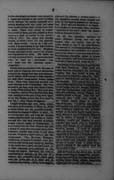
[p. 7]
bodies, shockingly mutilated, were placed in a wagon and exposed to the crowd by being driven through the streets, attended by a jearing taunting mob who could not cease their insults though their vicitms were still in death. There were plenty of women who looked at them and who gloried in their death as a deed of service to the Lord." (Ibid, p. 197.) She closes this terrible chapter, at which I have but just glanced, with these words: "As far as I am concerned I do not hesitate to say that I believe all these murders lie at his door; (Brigham Young) and that he will have to be personally responsible for them. His hands are red with innocent blood, his garments dyed with it, and no 'atonement' can ever wash out the damning spots." (Page 199).
Parties here are familiar with the case of three men at Coalville, who were shot on the trumped up charge that they were attempting to escape; of the arrest of their murderers and their examination before Judge Titus. They were committed for trial but upon arriving at the Penitentiary they were allowed to go free, when they wrote a letter to Judge Titus stating that "they were men of famiies—that it being harvest time they were needed at home and if they were wanted by his Honor at any time they could be sent for." (See Vidette newspaper.)
I might mention also such cases, notorious here, as the murder of Skeen by Ricks at Cache Valley and his sequittal nonwithstanding the clearest evidence of guilt. Of the young mean who not long ago became communicative about the murder of Robinson and who was soon reported as having broken a blood vessel at Cottonwood. It is now suspected that Sam Sirrine who told a friend of mine that the masks worn at the Robinson murder were made in his shop has also "broken a blood vessel." He has disappeared. The Morrisite Massacre, where men, women and children were shot down in cold blood, has become so familiar to the world that I need not dwell upon it. A little company have gathered in the bowery for prayer. Suddenly the voice of supplication is drowned by the roar of a cannon, the projectile from which tears away the lower jaw of a child and the shoulder of a woman. Then the carnage be- gins and Col. Burton, a present member of our legislative council, covers himself with glory by this wanton massacre of the helpless. But I will not describe it at length. It is another of those cases when the brave "Anointed of the Lord" drew "his bowie-knife to conquer or die."
Of all the atrocious murders of which Brigham Young and his red-handed clan are guilty that of the Aiken family is one of the most terrible. The account of it recently published in THE TRIBUNE being the confession of a participant in the crime to a correspondent of the San Francisco Chronicle, agrees in almost every particular with the accounts given in the books I have already made use of.
The family were attempting to get through Utah from California. Their outift and money were too tempting to the avaricious Prophet; they were seized as spies and turned back to California under the "safe" escort of Port Rockwell and two others of like character. While asleep two had their brains religiously knocked out, one was shot, but not fatally, and one escaped wounded. These two last met again after untold hardships and suffering, having dragged their bleeding bodies to Nephi. They were subsequently shot "until every muscle in the victims' bodies ceased to quiver." One writer says: "of all the cowardly and cold blooded acts which have made the Mormon Priesthood infamous, this wholesale murder of the Aiken family stands pre-eminent; second to that of Mountain Meadows only in extent, it exceeds it in wanton treachery, cruelty and violation of every principle held sacred even by marauding Arabs, wild Indians, by all savages except Mormon fanatics. A cloud of witnesses arise, and every incident is fully proved." (Appendix to Hickman's Confession.) The writer of the above is correct. Neither history or fiction ever presented anything in the line of bloody deed, it seems to me, quite so infernal as the tragedy when the full account is read.
Lest it should be said that I am, in this lecture presenting an exaggerated account, let me here introduce the statements of two or three United States officials concerning events that have come before them.
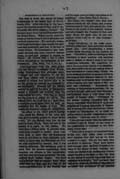
[p. 8]
STATEMENTS OF PUBLIC MEN.
The first is from the charge of Judge Cradlebaugh to the grand Jury at Provo, March, 1859. After referring to the murder of the Parrishes and Potter, and of the Mountain Meadows butchery, he says: "At the same place there was another person killed, Henry Fobbs. When here he made his home at Partial Terry's where his horse and revolver were stolen. He made his excape, tried to get to Bridger, was caught, brought back and murdered; and that is the last of Henry Fobbs. No investigation has been made; his body has been removed several times, so that now perhaps it cannot be found." He follows with a list of other crimes committed at the instigation of the Priesthood. (Des. News, Vol. 9, No. 2.)
A few days later, when this same grand jury had failed to investigate these crimes, Judge Cradlebaugh thus addresses them: "I might call your attention to the fact that when officers seek to arrest persons accused of crimes they are not able to do so; the parties are secreted and screened by the community. Scarcely had the officers arrived in sight of the town of Springville before a trumpet was sounded from the walls before the town. This was, no doubt for the purpose of giving the alarm. The officers leave the town and in a short time a trumpet sounds again from the wall, announcing that the danger is over. Witnesses are screened; others are intimated.
"An officer of the court goes to Springville, meets the Bishop of the town, asks him about a certain person for whom he has a writ. He (the Bishop) tells him he has gone to camp Floyd, while the fact is the person is in sight, in the streets. We have here a Bishop lying to prevent criminals being brought to justice. Such conduct goes to show that the community there do not desire to have criminals punished; it shows that the Parrishes and Potter were murdered by counsel, that it was done by authority. The testimony goes to show that the persons committing these murders are officers in that community, and that they have been promotoed for committing these hellish crimes. You have had sufficient timie to examine these cases. More than two days ago, you had all the testimony before you in the Parrish case and for some cause or other you refuse to do anything." (Des. News. Vol. 9, No.4).
Ah! Judge, the "cause" was that first cuase of nearly all the crime and human wretchedness in Utah, who sits in the Lion House in the midst of the enslaveed victims and calls hiimself the Prophet of God, and upon whom the great men or our own land so often wait, "to do him homage," as he says.
Judge Stickland, in the same place thirteen years later, thus addresses another grand jury. After enumerating a dozen bloody deeds occuring in his district he says: "Gentlemen, there is existing in this Territory, a most peculiar and startling state of affairs, to which I deem it my duty to call your attenion. My neighbors living in the immediate vicinity of an assassination, have said to me on my asking them if they had hear of a man being killed, 'we know nothing about it; no one gets killed in this county that does not deserve it, and turning away went about their avocations without asking who was killed or why the deed was committed. Gentlemen, the obeying of that peculiar injuction, 'do as you are told and mind your own business,' has furnished many a wild heart with a supper of human flesh. Polygamy is the merest nothing, compared with the bloody despotism which forced it upon and perpetuates it among the people, a despotism so strong that many persons are afraid to make an examination of, or make inquiries about a mruder committed at their own door." (Tribune, Jan. 12, 1872.)
I also give an extract from the address of Governor John B. Weller at the close of the examination of witnesses in the Robinson murder case:
"There are a number of respectable men in the city, (Salt Lake) some of whom have families, who dare not go on your streets of a night. Nor are they men who are afraid of shadows. They have shown their courage upon the field of battle in defence of the honor of their country, and would not shrink from meeting any of them single handed in the light of day; but they do not choose to meet an organized band of assassins at midnight. Is it not hard, that here in an American Territory, supposed to be under the protection of the national
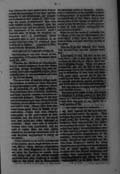
[p. 9]
flag, citizens who have perilled their lives to sustain the supremacy of our laws and the integrity of our Government, are compelled to remain in their houses at night to escape the hands of murderers? Men who have violated no law, trespassed upon the rights of no one but have simply incurred the displeasure of the dominant party? Can this state of things be tolerated on American soil? A government which habitually fails to give protection to its people must soon cease to command their confidence or respect." (Appendix to Stenhouse's Rocky Mountain Saints.)
PROCLAMATION BY PRESIDENT BUCHANAN.
The following is the first clause of the proclamation of President Buchanan, dated April 5th, 1858:
"Whereas, the Territory of Utah was settled by certain emigrants from the States and from foreign countries, who have for several years past manifested a spirit of insubordination to the constitution and laws of the United States.
"The great mass of settlers, acting under the influence of leaders to whom they seem to have surrendered their judgement, refuse to be controlled by any other authority. They have been often advised to obedience, and these friendly counsels have been answered with defiance. Officers of the Federal Government have been driven from the Territory for no offence but an effort to do their sworn duty. Others have been prevented from going there by threats of assassination. Judges have been violently interrupted in the performance of their functions, and the records of the courts have been seized and either destroyed or concealed. Many other acts of unlawful violence have been perpetrated, and the right to repeat them has been openly claimed by the leading inhabitants with at least the silent acquiescence of nearly all the others.
"Their hostility to the lawful government of the country has at length become so violent, that no officer bearing a commission from the Chief Magistrate of the Union can enter the Territory or remain there with safety; and all the officers recently appointed have been unable to go to Salt Lake, or any which [unclear] beyond the immediate power of the army. Indeed such is believed to be the conditions to which a strange system of terrorism has brought the inhabiants of that region that no one among them could express an opinion favorable to this Government, or evern propose to obey its laws, without exposing his life and property to peril."
These are not the words of partisans, but of officers of the law and Government, who have calmly looked upon the state of affairs in Utah, and have fearlessly spoken the same.
They are in perfect keeping with words that we hear from our own citizens every day.
A merchant of this city said to me not long since, "But a few years ago we did not dare, in this city, to utter a word hostile to Brigham Young. When our cup of indignation was full, we had to take our guns and go across the Jordan river hunting, or something of that sort, and there, with broad fields around us, so that we could be sure there were no eavesdroppers or priestly spies about, express ourselves, I fear not always in the smoothest language."
You who hear me to-night, know perfectly well that this is true.
The same spirit exists to-day, and indeed is dominant in a large portion of this Territory, as I shall show before I am through. I shall close this part of my theme by a brief mention of the
MOUNTAIN MEADOWS MASSACRE.
I say brief because all the facts have recently been laid before the people. They have been the heroic defense of these besieged men; the shooting of little girls dressed in white who were sent for water; the treachery by which they were all decoyed from camp; the soul sickening scenes of that terrible butchery; the distribution of the spoils and the disappearance of the children. They have heard how Geo. A. Smith, "the second man from God and the first from Brigham," visited the towns along the route in advance of the emigrants; how he called together and consulted in secret with the Church authorities and milita, how immediately these same Church authorities and militia went out "under orders," to do their work. They
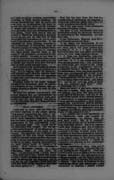
[p. 10]
have seen the guilty wretches immediately reporting to their master Brigham, his soul so "harrowed up" that he could not even order an investigation; his heart so moved with pity for these bloody butchers of women and children that he immediately promotes them and continues them in holy offices. They have seen at this day crowds of Mormons gathering to serenade Lee in his cell, and we who live in Utah have heard the expressions of joy on every hand at the failure to convict him. It has remained for John Codman, however, to add to the infamy of butchering these in-offensive persons, by trying to defame them, and to shield Brigham Young by claiming that these people deserved death at the hands of his priesthood, on account of disorderly conduct. It seems to me that it ought to have been enough that these people were butchered as they were, without trying to slander and traduce them after they have been in their graves eighteen years.
As for myself, I as much believe Brigham Young guilty of that crime as I believe in a God. It is in keeping with his character, with his past record, and the number there slain will not compare with the eggregate number that have elsewhere gone down beneath his power.
President Grant in his recent message thought it an anomalous state of affairs, and a disgrace to our civilization that polygamy should be allowed to exist in this nation.
We think it a greated marvel and a still greater disgrace that any ecclesiastical or organization should be allowed to have much control over the jury system that crimes like the Mountain Meadows Massacre must go unpunished.
BLOOD ATONEMENT.
I wish now to show what has been the prevalent teaching of the pulpit among "this people" concerning the right of taking the lives of those who would not submit to their theocratic despotism. I will take you back to Nauvoo, and to the early organization of this ecclesiastical body, Mr. Stenhouse says: "Dr. Avard was in full fellowship with Joseph. He was unquestionably believed by the Mormons to be in the confidence of the heads of the Church. He organized the brethren into captains over each company, gave signs and grips by which they should know each other by day or by night, binding themselves by the most sacred oaths to preserve in secrecy their works of darkness." (Rocky Mountain Saints, p. 91). Addressing them at one time, he said: "As the Lord liveth, I would swear a lie to clear any of you; and if this would not do, I would put them or him under the sand, as Moses did the Egyptian, and in this way we would consecrate much unto the Lord and build up his kingdom; and who can stand against us?" (Ibid, p. 92)
That this has been from the first the priestly idea of building up the kingdom, I believe the historical matter that I have already presented abundantly shows.
But I will pass along to the subsequent sermons of Brigham Young.
The most of you are familiar with that disaffection among the Mormons known as the gathering of the Gladdenites, as a distinct sect.
In the Tabernacle, Brigham thus delivered himself concerning them:
"I say again, you Gladdenites, do not court persecution, or you will come quicker than you want it. * * * I know what they have done here, they have asked exorbitant prices for their nasty stinking ribbons. * * * Now, you Gladdenites, keep your tongues still, lest sudden destruction come upon you. * * I say, rather than apostates should floursih here, I will unsheathe my bowie knife and conquer or die. (Great commotion in the congregation, and a simultaneous burst of feeling asssenting to the declaration.) Now, you nasty apostates, clear out, or judgment will be laid to the line and righteousness to the plummet. (Voices generally, "Go it! Go it!") If you say it is right, raise your hands. (All hands up.) Let us call upon the Lord to assist us in this and every good work." (Journ. of Discourses vol. 1, p. 83.)
Brave old hero! A few have chosen another for a leader. They go so far as to sell ribbons at a price that does not commend itself to his avarice; and full of the spirit of the heroes of the world's history, he stands up in a congregation of persons who do not dare to breathe a silent whispher against him, and striking such an attitude as would have brought tears of joy into the eyes of Napoleon, he flourishes aloft his imaginary bowie knife, and cries in thunder tones, "I will conquer or die."
I can present only a few speciments of his utterances upon the subject of blood atonement, or killing men to save their souls. Nor is it necessary that I should detain you by extended selections upon the subject. Let it be remembered that Brigham and his priesthood claim to be infallible; that their public instruction, it is said, is given under divine inspiration; that when matters of doctrine in the offical organ of the Church for its acceptance and government, it stands as obligatory and binding in the highest possible degree.
These enunciations, then, may not be weighted in the ordinary balances that human utterances are weighed in. They may not be looked upon as subject to the imperfections that attend the statements of all ordinary mortals; nor can they be regarded as matters that it is optional with the people to recieve. The word of Brigham is the word of the Lord with this people. Lest this should be disputed, I present a single
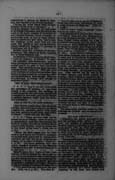
[p. 11]
extract from a sermon by Heber C. Kimball, who was one of the Twelve Apostles:
"To me, the word comes from Brother Brigham as the word of the Lord. * * He is the delegate that God has appointed to be Joseph's successor, and his word is the word of the Lord, whether it is written or not; whether it comes out as revelation or not it is the word of God to those who believe or practice it; and when this is done the blessings of the Lord God will rest upon this people to that degree that you cannot conceive or imagine."—(Journal of Discourses, vol. 2. p. 159).
So then, from the multitude of declarations upon this subject at hand, I present two or three examples only.
In speaking of those sweet words of Jesus, "Love they neighbor as theyself," he says: "All mankind love themselves; and let those principles be known by an individual and he would be glad to have his blood shed. This would be loving ourselves even unto an eternal exaltations. Will you love your brothers or sisters likewise when they have a sin that cannot be atoned for without the shedding of their blood? Will you love that man or woman well enough to shed their blood?
THIS IS WHAT JESUS CHRIST MEANT.
* * * * Any of you who understand the principles of eternity, if you have sinned a sin requiring the shedding of blood, except the sin until death, shoudld not be satisfied or rest until your blood should be spilled, that you might gain the salvation you desire.
THAT IS THE WAY TO LOVE MANKIND.
I have known a great many men who have left this church for whom there is no chance whatever for exaltation, but if their blood had been spilled it would have been better for them." (Jour. Dis., pp. 219, 220.)
* * * "There are sins that can be atoned for by an offering upon an altar, as in ancient days; and there are sins that the blood of a lamb, of a calf, or of turtle doves cannot remit, but they must be stoned for by the blood of the man." (Ibid, vol. 4, p. 54).
"When the time comes that we have need to shed blood then it will be necessary we should do it, and it will be just as innocent as to go and kill an ox when we are hungry, or in time of famine." (Ibid, vol. 6, p. 59). You know perfectly well that this is standard doctrine of the Mormon Priesthood, and that I could here quote it by the hour.
Elder Penrose, in a recent article, credited one of the writers in the Rocky Mountain Christian Advocate with truth in saying that there was "some virtue among the Mormons." So in the midst of so much abominable falsehood, I will give Brigham credit for stating two facts. The first is:
"I live above the law, and so do this people. (Ibid, vol. 1, p. 361). The other is:
"I could refer you to plenty of instances, where men have been righteously (?) slain in order to atone for their sins." (Ibid vol. 4, p. 230).
A few of these "many instances" I have tried to lay before you.
A correspondent of the New York Evening Post had an interview with Brigham soon after the Robinson murder, who said: "All these United States officials are a set of prejudiced scoundrels, and he didn't want any more of their decisions; they'd better be careful or they'll have to get out of this place. Yes, I'll put them out myself—send them home by a short cut." (Vidette, Jan: 12, 1868.) At the October Conference a few years since, Brigham said in the presence of many now in this house, in assigning his reasons for declining to be re-elected trustee-in-trust: "I have also another reason, a private one, but I guess I'll give it you. Lawyers are getting pretty thick here. They are getting to very troublesome with their lawsuits. It was just so at Nauvoo. They worried the life out of the Prophet Joseph, and finally secured his murder. They tried it on me there; but I told them if they didn't quit I'd sent them to hell cross lots, and they quit. And now they are at the same thing here. I have no wish to be troubled in this kind of way. I have no wish to go through the same thing here again. I will submit myself to the courts, but if they try that thing on me here, I give them fair warning now. If any of these so-called officers of the law try to arrest me and bring me before the damned, cussed bounds of the law the Government has sent out here to lord it over us, I'll send them to hell cross lots, so help me God."
The same spirit prevails to-day in Utah, although the practice may be somewhat restrained.
THE SAME SPIRIT TO-DAY.
I referred to the public serenade of Lee and the rejoicing at the failure to convict him. An attempt to assassinate Deputy Marshal Stokes by shooting at him was also made shortly after the trial; and another marshal in making arrests in this case, finds a whole community in arms against him. Let me quote the following from THE SALT LAKE TRIBUNE:
"Twenty-seven hundred dollars was the amount a Saint and assassin offered the boys at El Dorado Canyon and Fort Mohave, last winter, for reliable proof of Klingensmith's "accidental death. He stated that the said amount was a purse raised by the workman on the Lord's Holy Temple, at St. George, for procuring such information. Poor Klingensmith wasn't exactly right in the upper story, and was liable to get good men into trouble! Why didn't the good man, otherwise known as leader of the 'Latter-day Saints," offer enough to insure 'the accidental breaking of a blood vessel while jumping,' as was done once before, and
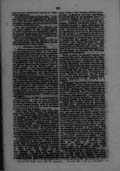
[p. 12]
thus save the trouble and expense of these idiotic affidavits."
All of which is well authenticated. I will also refer you to the gathering of the Indians, under Mormon Leadership, last fall, in immense numbers, around the Gentile town of Corinne and elsewhere.
Our new Executive, Gov. Emery, and the army officers of the United States, however, could not be hoodwinked, and by the prompt interference of the army forces, another of those historical "Indian outrages" was doubtless prevented.
No more will Brigham Young ever be able to hoodwink the non-Mormon public with reference to those events.
PERSONAL EXPERIENCE.
I will now present certain incidents from my own experience in Utah. If you have not already been convinced that it well becomes an avowed enemy of the Mormon priesthood to carry a revolver into the pulpit or anywhere else in this Territory, these circumstances will convince you; and in the light of them you can judge of the pretended horror of the Mormon press at such a course. I will say for myself, however, that I have ever felt that assassination, blood atonement and mob violence had gone about as far in this Territory as even that much abused passage about turning "The other cheek" called for; that there was a point beyond which Christianity did not require that even Methodist preachers should submit to have their own throats out or their families mobbed. And inasmuch as there is such poor protection in the law and in the courts here, I have felt justified in doing the best I could to protect myself.
In the summer of 1872 I commenced my labors in Provo. I was at first kindly received, and I wish here to say that I have ever been treated kindly, save by the Mormon priesthood and such of their followers as they could use as tools.
After I had been there a little time, that good and nobel man, Capt. Cunningham, died. I esteemed him very highly, and you can imagine my indignation when I heard his dying agonies and the lamentations of his betrayed widow mocked and howled around the streets. I did not fail to reprove this conduct and openly comment upon it as my feelings dictated. Soon after Orson Pratt came to Provo and delivered one of his characteristic sermons, roundly abusing all Gentiles and declaring that unless men entered into polygamy they must be damned.
I reviewed that sermon, and my remarks were publised in this city. Then a most bitter spirit of hostility manifested itself. My life was threatened, and I was informed by some of the most reliable persons in that town that plots to tar and feather me had been laid. On one occassion a friend of mine, who had overheard one of these plots, gathered his friends, and with their pistols, went to the place where I was holding service to protect me. A Mormon told me that Bishop Smoot had said, in his presence, that if I 'wished so remain in Provo, I must go slow." I proposed to go fast or slow, as I pleased, without consulting Smoot. The following summer I again went East and delivered lectures on the State of affairs in Utah. In one of them in Boston, I used the expression referred to in the beginning of this lecture. I soon heard the howl of the News, Herald, etc. Speeches that I had never thought of making were published at length for the purpose of stirring up bitterness and hatred towards me. My life was again threatened, and I received many letters of warning from Utah. The little Provo Times was doing its best to incite the people to violence; the following appeared in its columns:
"That Lyford, who slashes around the country with a Rev. attached to his patronymic like the curl of a hog's tail, has been trying, and to some purpose, to raise the wind by slandering his betters and abusing a people whose principal fan t [sic.], as far as his presence here is concerned, is that they have treated him only too well; for all of which the Rev. Bilk, when he returns to Provo, deserves escorting out of town mounted on that triangular wooden steed usually employed in the building of a fence."
I published their article in the East, sent them word that I had consecrated my talent to shout to God, and then came back to my work. During my three years' stay in Provo I preached my sermons only, in which I assailed Mormonism as a system of irreligion and oppression. During the delivery of the last of these five, persons were heard to mutter in the church that they "would like to send three or four balls through me." Another on the streets offered to be one of a party to go and cut my throat, and many were the threats of tar and feathers. My friends, some of them, during my last week in Provo, slept every night in my house with arms, for my protections, and that house stood near the spot where Poor Brown was assassinated but a little time previous to my going there, and whose guilty murderers are still at large! On all these occassions I did what I deemed was simply prudent. I went shod with what seemed to me a proper preparation of the gospel of peace, under the circumstances. I carried a revolver in the pulpit and out of it, and would do so again. I make neither apology or defence, and what I now say, I say to show the world that the spirit of outlawry that begins at Nauvoo and has made every page of Mormon history red with blood, is rife in Utah to-day.
I do not like to use a slang phrase here, but I beg leave to inform the News, the Herald and the Odgen Junction, together with Brigham Young their mat-
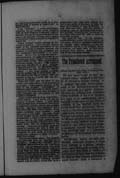
[p. 13]
ter, that turning the other cheek to a red-handed gang of outlaws is "played out" in this Territory.
I say "outlaws." A more murderous, villanous set of outlaws never breathed vital air than Brigham Young and some of the men who are associated with him in the rule of the Mormon Church; and I appeal to the record I have presented in support of what I say.
I have confined myself entirely to the record of murder. I have not had time to speak of the heartless oppression of the poor, the robery of helpless families, the coercions of hundreds into polygamy and the consequent wretchedness of so many homes. While I was writing this lecture I was interrupted by a lady who came to me for help and whom I knew to be as reliable as any person living. With tears streaming down her cheeks, she said: "My husband came here with $75,000 in gold. Brigham Young has got it all. He has got my home. I can show his own receipts for $12,000 tithing, I had some mining property, they are getting that all away from me. I was reared in the lap of luxury, but I am working to-day in a kitchen and my children cry for bread!"
Some day I will give her story to the world, but in this lecture I have avoided all such cases. I have scarcely referred to the time of the so-called "reformation" of which I might have made so much, preferring rather to show that this practice of crime extended over every period of this preistly domination.
I have quoted entirely from well authenticated history. I have given you the utterances of public officers. I have taken words enough from Brigham's own mouth to condemn a million men in any country but this. And yet I have presented but a little from the data I had at hand. From books containing many chapters I have taken only a few cases. But these books do not contian all the terrible testimony. Occasionally a victim is found—like the unknown man on the bench towards Camp Douglas, or a skeleton exhumed as in Brigham's yard. Said an old apostate to me one day: "You may read all the books and papers in creation and then if these canyons and sage brush fields could speak they would tell of such deeds of blood as the world never dreamed or heard of before." Alas! It is too true.
And yet one nation delays. We annually get a little talk from the President about polygamy. Occassionally a bill gets before congress, that provides for the supremacy of law and goverment here, and some contempable Sargent is found to hack it to pieces with his little hatches. Brigham parades himself before the world and boasts that he can buy the whole Government. If the law once gets hold of him some attorney general is found hurrying forward backed with the public rumor that he is a polygamist, and that, even though this fact be not shown in the trial, is made the basis of extending to him protection. A jury finds one man, only one, guilty of polygamy, and he is turned loose on bail, and through "forgetfullness," on the part of the Judge who tried the case, it runs on from term to terms.
Out upon all this. If the American people have any power left in America, let this system of crime, oppression and fraud be brought under subjection to law and government, and let it be possible for us to hold up our heads here in Utah when travelers from foreign lands remind us that we are American citizens.